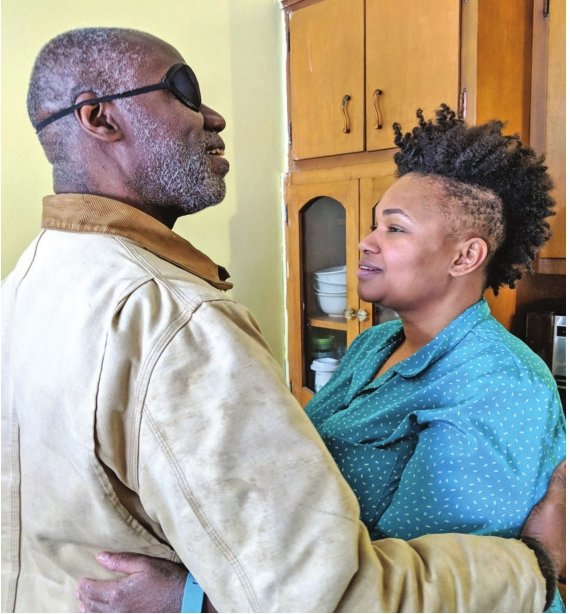
The title “Broke-ology” is explained up front as the study and science of being broke and, in this case, black. The play, however, is also about a whole lot more than that. It’s about family, dignity and pride, about the delicate relationship between two adult sons who are trying to carve out a life for themselves, while still attending to an increasingly debilitated father struggling to stay alive.
Rico Bruce Wade is the father, William King, once strong and industrious, working long hours and two jobs to support a family of four.
He tries to protect his two growing teenage boys while living in a gang-ridden urban neighborhood in Kansas City.
William has been stricken with muscular dystrophy, is slowly going blind, and, to add insult to injury, has experienced the loss of his loving wife, Sonia. Wade is convincingly vulnerable in this role as William’s disease progresses, his mind begins to drift, and he begins to need full time care.
His sons attempt to be up to the task. The elder, Ennis, is played by Daniel Bonner, his character much like that of his father — a man with two jobs and a pregnant wife who quickly becomes a new mother. Subsequently, he readily admits to now being overwhelmed with responsibility.
Ennis is the inventor of the Broke-ology concept, much to the amusement of the younger brother, Malcolm. Unlike Ennis, a true-blue working-class guy, Malcolm has gone off to college, completed a master’s degree and is now working for the Environmental Protection Agency doing research on climate change.
He’s come home to help take care of Dad, but he also yearns to return to Connecticut to pursue an academic career and a love relationship. He feels caught between competing values — love for his father and desire for a life of his own, outside of the bubble of his father’s shrinking life.
Malcolm, played by Lekeaton Wilson, is the more measured and analytical of the brothers. Portrayed with a steady and dry determination, he comes across as quite real.
The brothers duel back and forth with playful banter, competitive dominoes, earnest confrontation and a scene where, while tipsy, they together laughingly steal a gnome —making it a silent fourth partner in the domino game.
Ennis is trying to get his brother to stay and help care for Dad so that he might have a moment to breathe and have a small slice of life for himself.
Both brothers convey a strong sense of authenticity as they grapple with the universal dilemma of how to find adequate eldercare.
Mean while, Dad inadvertently complicates their challenge by regularly guilt-sharing a dream. In the dream he, his wife and Malcolm are in a boat drowning, and he has to decide who to save, his wife or his elder son.
This is the moment where the idea of “Broke-ology” begins to crystallize, to make sense. All three men realize that none of them have sufficient resources to pay for a reasonable quality of assisted living care. Together they reflect on family values —on what is really important — no matter how much or how little a family has, economically.
Tyra High is Sonia, and floats in and out of the play, mostly as a ghostly hallucination in the mind of William, when no one else is there. Tyra, consistent with her surname, brings a high level of energy and a lyrical singing type of speech to her role as Mama Sonia. She conveys a strong sense of what her character has contributed to the integrity and upbringing of her two sons.
In the end it is William who assists his sons with resolving the irresolvable.
Broke-ology is a concept most understood by those who have grown up in abject poverty, with parents who worked very hard to protect their children from feeling they were lesser beings.
“Broke-ology” March 24, 8 p.m. - 10 p.m.
25, 2 p.m. - 4 p.m. $15 The Robin Theatre, 1105 South Washington Avenue, Lansing. www.therobintheatre.com
Support City Pulse - Donate Today!
Comments
No comments on this item Please log in to comment by clicking here